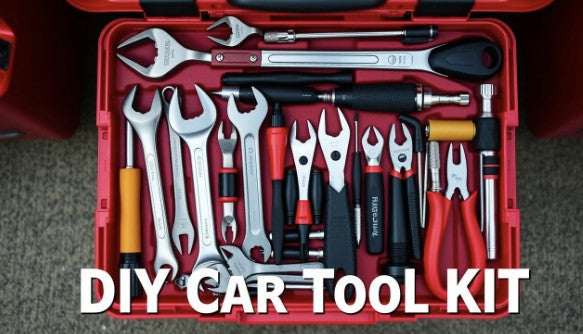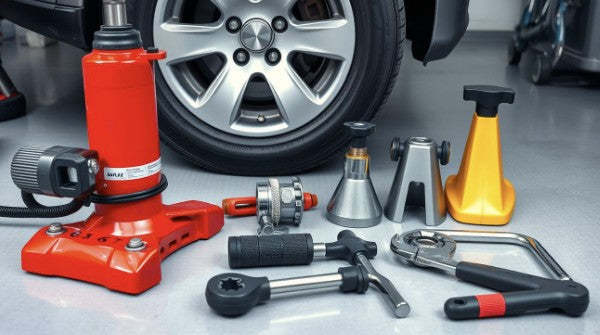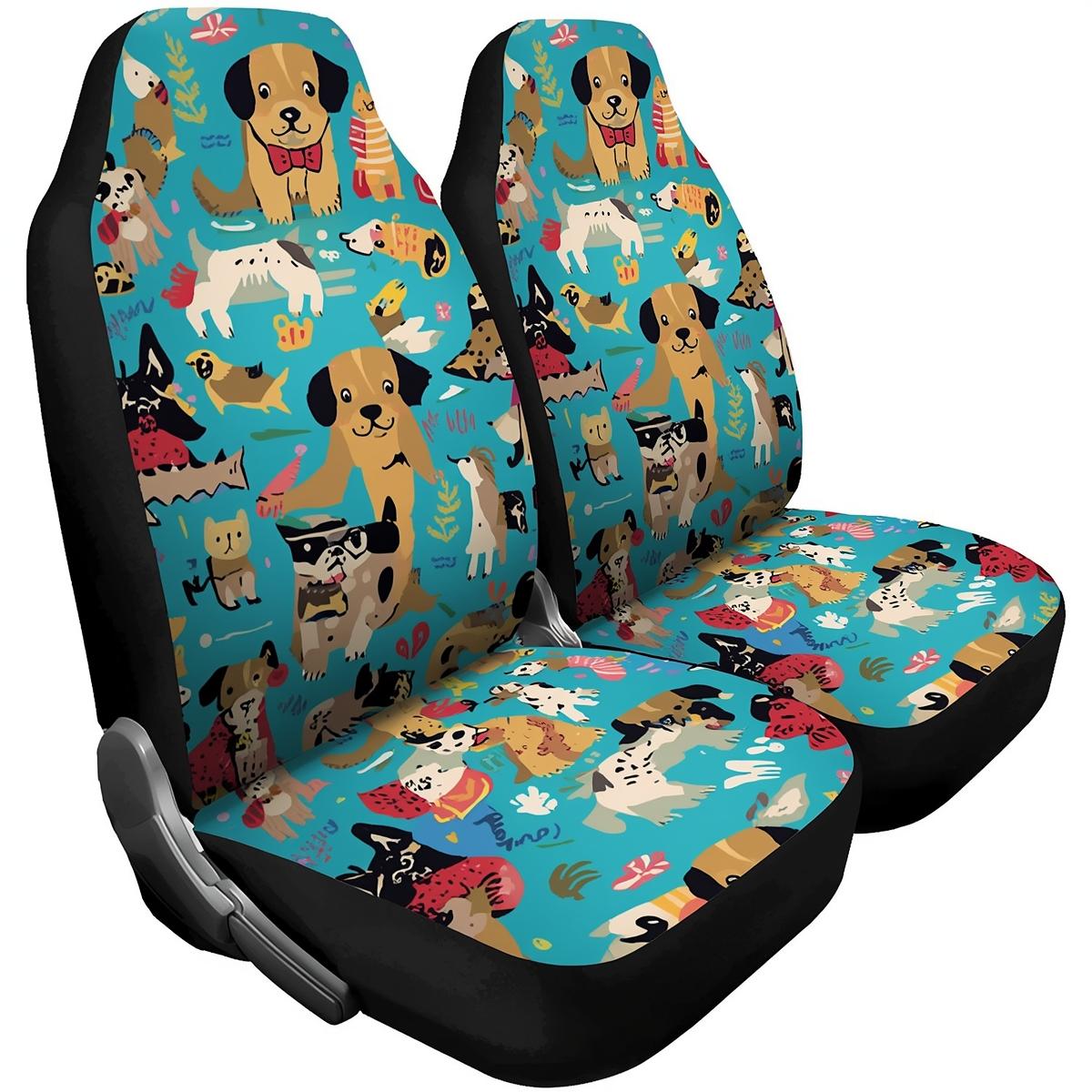Creating your own DIY car tool kit is a smart investment that can save you hundreds of dollars in mechanic fees while giving you the satisfaction of handling repairs yourself. Whether you're a beginner looking to perform basic maintenance or an enthusiast ready to tackle more complex repairs, having the right tools organized and accessible is crucial. This comprehensive guide will walk you through selecting essential tools, organizing them effectively, and building a versatile kit that won't break the bank.
Why Build Your Own DIY Car Tool Kit?
Before diving into the specifics, let's understand why creating a dedicated automotive tool kit makes sense:
Cost Savings
Even simple repairs at auto shops can cost $80-150 per hour in labor. With your own tools, you'll recoup your investment after just a few DIY repairs.
Convenience
Having the right tools ready means you can address issues immediately rather than scheduling appointments and being without your vehicle.
Learning Opportunity
Working on your own car builds valuable mechanical knowledge and confidence with each successful repair.
Quality Control
You can ensure repairs are done correctly and with quality parts when you handle them yourself.
Essential Tools for Your DIY Car Tool Kit
Let's break down the must-have tools into categories based on their function and importance. We'll start with the absolute essentials that form the foundation of any car tool kit.
Basic Hand Tools
Socket Set - Look for a comprehensive set with both metric and SAE (standard) sizes. A 3/8-inch drive is versatile for most automotive work.
Combination Wrenches - Get a set with both metric and standard sizes to match your vehicle's requirements.
Screwdrivers - Include both Phillips and flathead in various sizes. A magnetic tip is helpful for retrieving dropped screws.
Pliers Set - Include needle-nose, slip-joint, and channel-lock varieties for different gripping needs.
Adjustable Wrench - A 10-inch adjustable wrench can handle various bolt sizes in a pinch.
Budget-Friendly Recommendation
For beginners, consider a comprehensive mechanics tool set that includes most basic hand tools in one package. Brands like Craftsman, Kobalt, and DEKOPRO offer quality starter sets between $50-100.
Specialty Automotive Tools
Oil Filter Wrench - Essential for oil changes, make sure it's the right size for your vehicle's filter.
Torque Wrench - Critical for properly tightening bolts to manufacturer specifications.
Breaker Bar - Provides leverage for loosening stubborn, tight bolts.
Jack and Jack Stands - Never work under a vehicle supported only by a jack; always use jack stands rated for your vehicle's weight.
OBD2 Scanner - For vehicles made after 1996, this helps diagnose check engine lights and other electronic issues.
"Always prioritize safety tools like jack stands and work gloves. No repair is worth risking your safety."
- Experienced DIY Mechanic
Safety Tools and Equipment
Safety should never be compromised when working on your vehicle. These items are non-negotiable for your DIY car tool kit:
Personal Protection
Safety Glasses - Protect your eyes from debris, fluids, and chemicals.
Work Gloves - Mechanic-specific gloves offer protection while maintaining dexterity.
Disposable Nitrile Gloves - For handling oils, fluids, and chemicals.
Shop Towels or Rags - For cleanup and protecting surfaces.
Vehicle Safety
Jack Stands - Always use these when lifting your vehicle.
Wheel Chocks - Prevent vehicle movement when jacked up.
Fire Extinguisher - A small ABC-rated extinguisher for emergencies.
First Aid Kit - For minor injuries that may occur during repairs.
Safety Warning: Never substitute proper jack stands with makeshift supports like cinder blocks or wood. Your life depends on proper safety equipment when working under a vehicle.
Diagnostic and Electrical Tools
Modern vehicles rely heavily on electrical systems. These tools help you diagnose and fix electrical issues:
Digital Multimeter - For testing voltage, resistance, and continuity in electrical circuits.
OBD2 Scanner - Reads and clears diagnostic trouble codes from your vehicle's computer.
Test Light - A simple tool for checking if a circuit has power.
Wire Strippers/Crimpers - For electrical repairs and modifications.
Electrical Tape and Wire Connectors - For securing electrical repairs.
Pro Tip: Even a basic OBD2 scanner can save you money by helping you determine if a check engine light indicates a simple fix you can handle yourself or something requiring professional attention.
Budget-Friendly Diagnostic Tools
For beginners, start with a basic OBD2 scanner ($25-50) and a multimeter ($15-30). These affordable tools can diagnose most common electrical issues.
Fluid Maintenance Tools
Regular fluid changes are among the most common DIY maintenance tasks. These tools make the job cleaner and easier:
Oil Drain Pan - With a spout for clean disposal of used oil.
Funnel Set - Various sizes for different fluid fills.
Oil Filter Wrench - Specific to your vehicle's filter type.
Fluid Transfer Pump - For extracting fluids from tight spaces.
Measuring Containers - For precise fluid replacement.
Environmental Note: Many auto parts stores accept used oil and other fluids for recycling at no charge. Always dispose of automotive fluids properly.
Emergency Roadside Tools
Some tools should travel with you for roadside emergencies. Keep these in your vehicle at all times:
Jumper Cables or Jump Starter - For battery issues.
Tire Pressure Gauge - Digital models are more accurate than pencil types.
Tire Inflator - 12V models plug into your car's power outlet.
Flashlight - Preferably hands-free like a headlamp.
Reflective Triangles or Flares - For visibility during roadside stops.
Compact Tool Kit - Basic tools for emergency repairs.
Ready-Made Emergency Kits
If building your own emergency kit seems overwhelming, consider a pre-assembled roadside emergency kit ($30-60) that includes most essentials in one package.
Advanced Tools for Serious DIYers
As you gain experience and tackle more complex repairs, consider adding these tools to your collection:
Power Tools
Impact Wrench - Electric or air-powered for quick bolt removal.
Air Compressor - Powers air tools and inflates tires.
Power Drill - With socket adapters for various applications.
Specialty Tools
Compression Tester - For diagnosing engine performance issues.
Brake Bleeding Kit - For proper brake fluid replacement.
Specialty Pullers - For bearings, steering components, etc.
Pro Tip: Consider renting specialty tools for one-time jobs rather than purchasing them. Many auto parts stores offer tool rental programs.
Budget-Friendly Tool Recommendations
Building a complete DIY car tool kit doesn't have to break the bank. Here are strategies for creating a quality kit on a budget:
Starter Kit Recommendations
|
Tool Category |
Budget Option |
Mid-Range Option |
Approximate Cost |
|
Mechanic's Tool Set |
DEKOPRO 158-Piece Set |
Craftsman 135-Piece Set |
$40-100 |
|
Jack & Stands |
Torin Big Red Set |
Blackhawk B6350 |
$50-120 |
|
Diagnostic |
ANCEL AD310 OBD Scanner |
Innova 3100j Scanner |
$25-80 |
|
Multimeter |
AstroAI Digital Multimeter |
Klein Tools MM400 |
$15-50 |
|
Oil Change Kit |
Capri Tools Oil Filter Set |
GearWrench Oil Service Kit |
$20-40 |
Money-Saving Strategies
Start with a comprehensive set - A mechanic's tool set gives you many tools at once for less than buying individually.
Watch for sales - Tools often go on sale during holidays like Father's Day, Black Friday, and Christmas.
Consider refurbished tools - Many manufacturers offer certified refurbished tools with warranties at reduced prices.
Buy lifetime warranty tools - Brands like Craftsman, Husky, and Kobalt offer free replacements if tools break.
Prioritize quality for safety items - Never skimp on jack stands, safety glasses, or other safety equipment.
Storage and Organization Solutions
A well-organized tool kit makes repairs faster and more enjoyable. Here are effective ways to store and organize your DIY car tools:
Storage Options
Portable Toolbox - For tools you might need to take to the vehicle.
Rolling Tool Cabinet - For larger collections and heavier tools.
Pegboard System - For visual organization and easy access.
Drawer Organizers - Keep small parts and tools sorted.
Organization Tips
Use foam inserts - Cut to fit tools for easy identification and to prevent movement.
Label everything - Especially drawers and bins with multiple items.
Group by function - Keep related tools together (e.g., all electrical tools in one area).
Create a mobile kit - For the most commonly used tools that can travel to the vehicle.
Pro Tip: Take a photo of your organized tools before a big project. This makes it easier to ensure everything gets put back in its place when you're finished.
Tool Storage Solutions
Invest in quality storage that grows with your tool collection. A good starter option is a rolling tool chest with multiple drawers ($100-200).
Tool Maintenance and Care
Proper maintenance extends the life of your tools and ensures they're ready when you need them:
Clean after use - Wipe down tools to remove grease, oil, and debris.
Prevent rust - Apply a light coat of tool oil to metal surfaces.
Check for damage - Inspect tools regularly for wear or damage.
Maintain moving parts - Lubricate hinges, ratchet mechanisms, and adjustable parts.
Store properly - Keep tools in a dry environment, away from extreme temperatures.
Maintenance Reminder: Set a calendar reminder to inspect and maintain your tools quarterly. This simple habit will significantly extend their lifespan.
Beginner-Friendly DIY Car Projects
Once you've assembled your DIY car tool kit, start with these beginner-friendly maintenance tasks:
Oil and filter change - Save $30-80 per change while learning basic maintenance.
Air filter replacement - A simple 5-minute job that improves engine performance.
Wiper blade replacement - Quick, easy, and significantly cheaper than service centers.
Battery maintenance - Clean terminals and check connections to prevent starting issues.
Tire rotation - Extends tire life and improves handling with basic tools.
Learning Resources: Before attempting any repair, consult your vehicle's service manual, watch tutorial videos specific to your make and model, and consider joining online forums for your vehicle where you can ask questions.
Building Your DIY Car Tool Kit: Final Thoughts
Creating a comprehensive DIY car tool kit is an investment that pays dividends in both savings and satisfaction. Start with the essentials, add tools as you take on more complex projects, and always prioritize quality for safety-critical items. Remember that organization is just as important as the tools themselves—a well-organized kit makes every job easier and more efficient.
With your own DIY car tool kit, you'll gain independence from mechanic shops for routine maintenance and many common repairs. The knowledge and confidence you build with each successful project are just as valuable as the money you'll save. Start small, learn continuously, and watch your skills grow alongside your tool collection.
Start Building Your DIY Car Tool Kit Today
Begin with a quality mechanic's tool set and add specialized tools as your skills and projects expand. The sooner you start, the more you'll save on vehicle maintenance and repairs.
Frequently Asked Questions About DIY Car Tool Kits
What are the absolute minimum tools I need for basic car maintenance?
For very basic maintenance, you'll need: a socket set with metric and standard sizes, combination wrenches, screwdrivers (Phillips and flathead), pliers, jack and jack stands, oil filter wrench, oil drain pan, and safety equipment (gloves and glasses). This minimal kit will allow you to handle oil changes, air filter replacements, and simple part swaps.
How much should I budget for a starter DIY car tool kit?
A good starter kit with quality tools will cost between $150-300. This includes a comprehensive socket/wrench set ($50-100), jack and stands ($50-80), basic diagnostic tools ($30-50), and safety equipment ($20-40). You can start with less and build gradually, but these essentials will handle most common maintenance tasks.
Do I need different tools for different car makes and models?
While most basic tools are universal, you may need specific tools depending on your vehicle. European cars often use metric sizes, while older American vehicles may use SAE (standard) sizes. Some vehicles also require specialized tools for certain repairs. Check your vehicle's service manual or online forums for any special tool requirements.
How do I know if I need metric or SAE tools?
Most modern vehicles (post-1980s) primarily use metric fasteners, while older American vehicles often use SAE (standard) sizes. Japanese and European vehicles almost exclusively use metric. When building your kit, it's safest to include both metric and SAE tools, or check your vehicle's service manual for specifications.
What's the difference between cheap and expensive tools? Is it worth paying more?
Higher-priced tools typically offer better durability, precision, and comfort. For tools you'll use frequently or that involve safety (like jack stands), investing in quality is worthwhile. For occasional-use specialty tools, mid-range options often provide the best value. Many professional mechanics recommend buying mid-range tools with lifetime warranties for the best balance of quality and cost.




Leave a comment
This site is protected by hCaptcha and the hCaptcha Privacy Policy and Terms of Service apply.